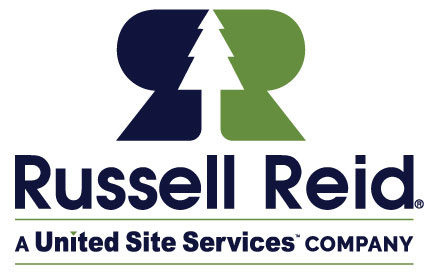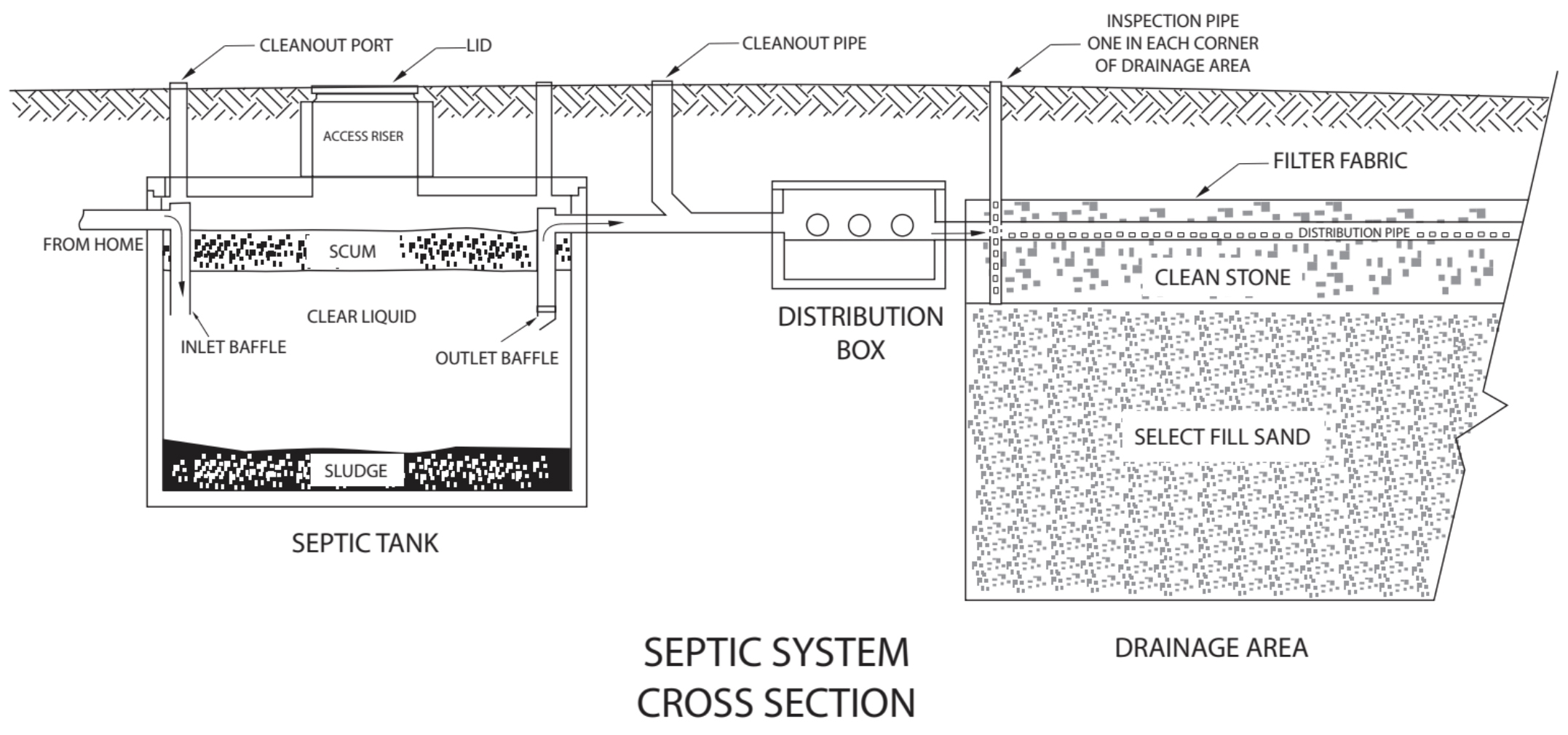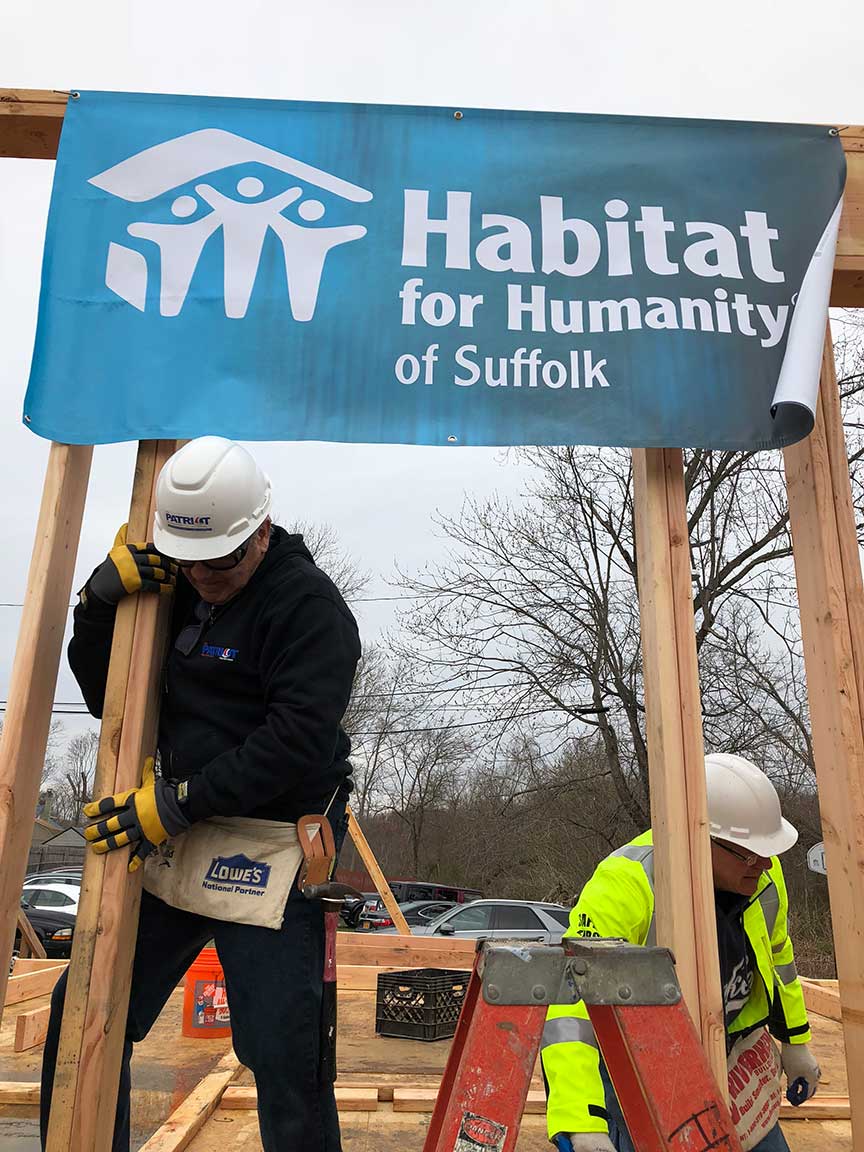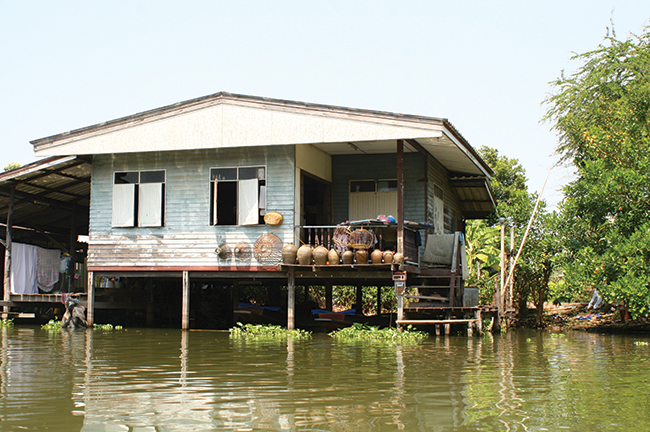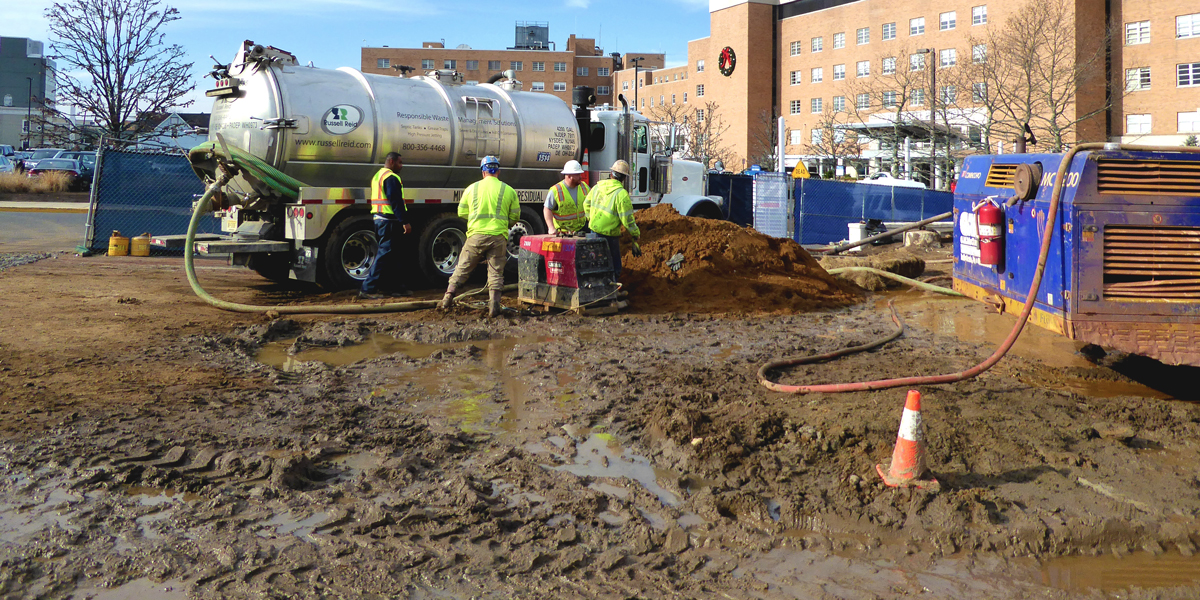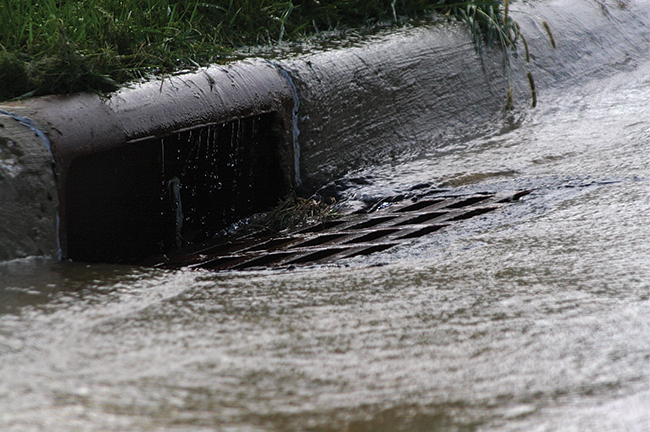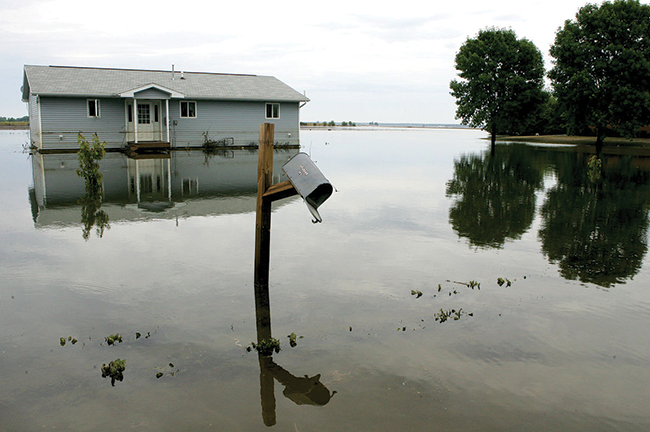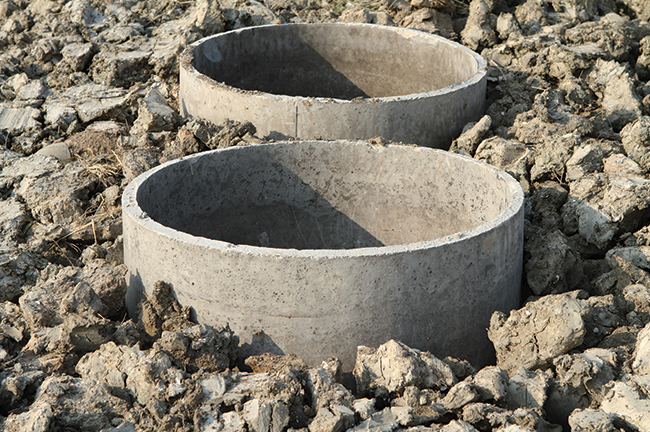Septic Pumping During COVID-19
Septic pumping is one of the most fundamental things that you can do to keep your septic system functioning properly. With residents spending more time at home to abide by local COVID-19 shelter-in place orders, it’s important to be conscious of the increased use of your residential septic system. Household members being home more contributes to the production of more waste water along with increased home activities that impact your septic system.
As you increase use of your septic system, you’ll need to increase the frequency in which your septic system is serviced. The good news is that waste management services have been deemed essential by Federal and State governments and septic service can be completed without contact, abiding by social distancing practices.
As a homeowner, proper septic management practices are essential to help keep your septic system in peak operating condition. Here are some key things you should understand about your septic system and take into consideration during these high use times.
WHAT IS A SEPTIC SYSTEM?
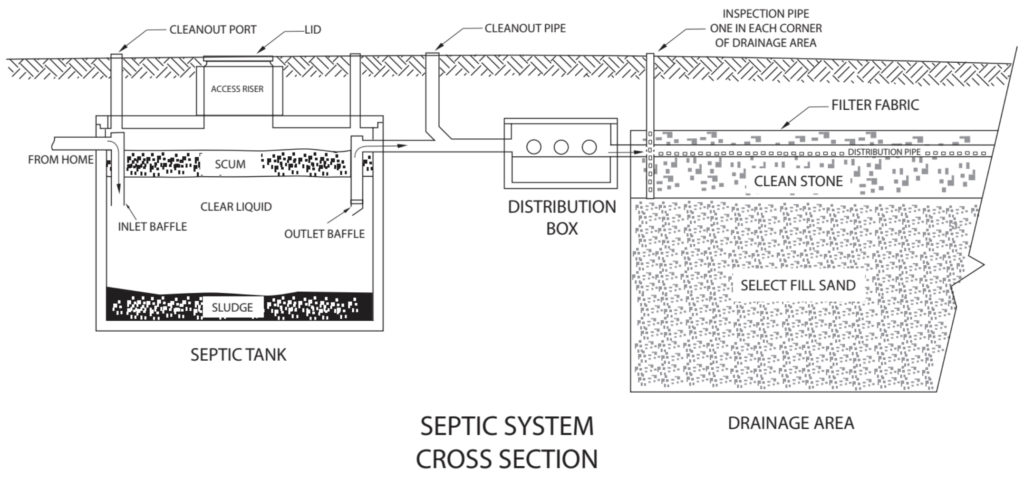
A subsurface sewage disposal system, commonly known as a septic system, consists of two main components: the septic tank, also known as the treatment tank, and the drainage area, often referred to as the leach field. The system also includes a main sewer line, which connects all plumbing fixtures to the septic tank, as well as a distribution box that connects
the septic tank to the drainage field. The septic tank is buried approximately 10 to 15 feet from the dwelling.
The purpose of a septic system is to treat and dispose of wastewater generated by the occupants. When properly installed and adequately maintained, septic systems are more
economical than sanitary sewers and just as efficient.
HOW YOUR SEPTIC SYSTEM WORKS
All wastewater generated from the dwelling enters the septic tank where primary treatment occurs. Anaerobic bacteria (bacteria found in environments without oxygen) thrive in the septic tank where they organically break down solids, creating sludge. Lighter materials such as grease and soap float to the top of the tank and form a layer called scum. This simple settling process allows virtually all of the wastewater (effluent) to flow out of the septic tank free of grease, soap and solids. It is important to remember that the septic tank inlet and outlet pipes are near the top of the tank. Thus, the septic tank always appears full.
The relatively clear wastewater exits the septic tank outlet and flows into the distribution box (D-box). The purpose of the distribution box is to evenly distribute the wastewater flow throughout the drainage field. Once in the drainage field, the wastewater passes through perforated lateral pipes, a layer of crushed stone and finally through several feet of unsaturated soil. As the treated wastewater travels through the soil, bacteria die off and the water is purified.
SEPTIC SYSTEM MAINTENANCE
Periodic maintenance is the key to extending the life of your septic system and preventing costly repairs. When the combined depth of the sludge and scum layers equal one-third of the septic tank capacity, the tank should be pumped. The accumulated sludge and scum from the septic tanks should be pumped a minimum of every three years, or more frequently if your household consists of four people or more.
A general rule for locating your septic tank is to probe with a shale bar or steel rod 10 to 15 feet from where the main sewer line exits the foundation of the dwelling. Patience and determination will help you locate the outer edges of the tank. Once located, dig a hole toward the center to expose the main cover only, usually 24" in diameter.
Russell Reid, A United Site Services Company offers septic pumping services in the greater Tri-State area. Schedule septic pumping services today or call 1.800.356.4468 to speak with a customer service representative today!
It’s Easy to Digest Sustainability with Russell Reid
The Russell Reid Company prides itself on being a company with its goals set toward the future. Our projects, services, and team keep sustainability in mind, particularly in our work with grease trap pumping. We don’t blame restaurant owners for not thinking twice about where their grease goes after it’s out of the tank. But the truth is that the greasy leftovers from your favorite guilty pleasure are just at the beginning of its life –– and purpose.
In a typical month, the team at Russell Reid can deliver up to 300,000 gallons of grease trap waste, or what is known as FOG (fats, oils, & grease) to our partners at the Joint Meeting of Essex and Union Counties (JMEUC), a Publicly Owned Wastewater Treatment Works (POTW). It is received in the Scum Collection System and later pumped into an anaerobic digester that uses the grease as a food source for the organisms that live inside. These organisms use the process of anaerobic digestion to metabolize and therefore breakdown the lipids and proteins that makeup the grease. The waste products of this digestion include carbon dioxide, hydrogen sulfide, methane, and water vapor.
While those gases are waste for the organisms that break down the grease, they are actually vital resources to the process that unfolds at Joint Meeting. The gas from the digester is cooled, and the methane is separated from the rest of the byproducts so it can be used as fuel for generators. Using solely the methane produced from the grease that Russell Reid pumps, a.k.a. the food scraps from your favorite restaurants, JMEUC is able to sustain 75% of their electrical demand.
The chain of sustainability doesn’t stop there though –– the waste heat given off during the process is used to heat water in a boiler system for both comfort and the heating of the digestion process itself. Through the grease delivered by Russell Reid from our grease trap service, the diets of anaerobic organisms, and the innovation of our partners at POTW, JMEUC is nearing a closed system of energy conversions.
So go ahead, eat out for dinner tonight! The leftovers will live on as a meal for some other living thing, and help lead us down a path of sustainable recycling and energy consumption!
President Gary Weiner Steps On-site with Habitat for Humanity
Kudos to our sister company, Mr. John, for working so closely with Habitat for Humanity over the past few years. This past month, Habitat for Humanity Suffolk County celebrated its 30th anniversary by having CEOs from across Long Island participate in building two homes.
Among the participants was Gary Weiner, President of Mr. John and Russell Reid and active donor to the non-profit. "I thought it was an opportune time to get out and pitch in and actually do the work. Rather than just making a donation in kind, it’s where the rubber hits the road, swing the hammer, bang some nails, and build a house" Weiner said.
There seems to be something special about getting out of the office to participate in real work that makes a difference in the community. Habitat for Humanity has built over 190 homes in the past 30 years, providing affordable homeownership or families in need.
To read the full article on FiOS1News, click here.
Russell Reid Takes on the Manasquan River Intake Pump Station Sediment Removal Project
In August of 2013, Russell Reid executed the Manasquan River Pump Station Sediment Removal Project in Wall, New Jersey. We dedicated a team of six (6) Field Service Technicians, along with six (6) Service Vehicles to complete the project, which took a total of four (4) days to complete (August 20th through August 23rd).
The Manasquan River Pump Station Sediment Removal Project required us to remove river sediment from the Manasquan River intake pumping station. We used two (2) of our Combination Jet-Vac trucks, two (2) Vacuum Containers, along with Confined Space Entry to execute the service. The sediment that was removed from the intake station was then managed on site in a contained area designated by the customer
Russell Reid is committed to providing the best customer service experience our industry has to offer. In order to achieve this goal, we created a detailed project plan for our Field Service Technicians and Project Management Team prior to the start of the project. The first step was to perform a site visit which allowed us to figure out the most efficient way to complete the work. After reviewing the scope of work and the lay of the land, we decided to load-in and set up all the equipment we would need to complete the job before the work actually started. This process included leaving some of the trucks onsite, having a truck available at all times to refuel the onsite equipment and having all the equipment (hose, lighting, rope, confined space entry gear, etc.) readily available to perform the service as efficiently as possible. This initial planning allowed Russell Reid to perform the work in a well-organized, efficient manner.
Despite our extensive preparation, our Service Technicians did face some obstacles as the job progressed. One of the obstacles involved water leaking into the tank under the tarps which resulted in filling up the Vacuum Containers with more liquid than solids. In order to resolve this issue, the customer had to reset the pump to evacuate the water coming in from under the tarps. In addition, Russell Reid cleaned the solids from the wall which allowed the water to run through underneath to where the hydraulic pump was set (which was deeper than the floor we were cleaning), allowing the pump to remove the water. We also evacuated piles of sand which slowed down the process of removing the sediment. Not only is vacuuming sand more time consuming, but the distance in which we were vacuuming the sediment out was also very extensive (over 200 feet).
A considerable amount of time and effort was put into the project and the Russell Reid Company was pleased with the overall outcome. Regardless of the hiccups the Field Service Technicians encountered, the technicians were well prepared and were able to overcome the obstacles. Everyone involved in the project contributed to the company’s success and our customer was extremely impressed in our ability to prepare for the job, execute our plan, and perform the service in a timely manner.
The Manasquan River Pump Station Sediment Removal Project is a testament to the way the Russell Reid Company continuously provides the best service in the industry. We take pride in our ability to get the work done the right way and the way we conduct ourselves as a company. Our goal is to maintain our good customer relationships and continue to build more in the future.
Russell Reid is available for serve our customers 24 Hours: 7 Days a Week. Please feel free to reference our website or call us at (800) 356-4468.
Russell Reid / Mr. John Company Invited to speak at NJEMA Meeting
The Russell Reid/Mr. John Company has been invited to speak at an upcoming meeting of the NJ Emergency Management Association (NJEMA). The meeting will be held on June 11th and will take place at Clancy’s Restaurant in Neptune, NJ.
As the region’s leading provider of temporary restrooms and waste removal services, Russell Reid / Mr. John’s products and services have been instrumental in the post Hurricane Sandy clean-up efforts. The company is uniquely poised to provide the range of services needed for disasters such as this, including wastewater removal and disposal, roll off containers for bulk solid waste as well as portable toilets, portable shower facilities and other temporary restroom related rentals. Post clean-up efforts are continuing with storm sewer and catch basin cleaning, removing the large amounts of sand and debris deposited there by the storm.
The NJ Emergency Management Association (NJEMA) represents all coordinators and resources connected to the Office of Emergency Management (OEM) serving the State of New Jersey, and is dedicated to the protection of life and property. Members include Office of Emergency Management Personnel as well as professional members offering products and services related to disaster recovery.
As a new member of the NJEMA, Russell Reid / Mr. John has been asked to share information about their line of products and services and how they can assist emergency management personnel with clean up and restoration efforts. Gary Weiner, President and COO of the Russell Reid / Mr. John Company will address the group. “I’m honored to be asked to share our offerings with the membership of NJEMA” said Gary. “From disaster response and recovery through reconstruction, our services are essential and our team has proven time and again to be a reliable and responsive partner during difficult times.” Mr. Weiner has led the company through many local and national disasters, providing equipment and services for the World Trade Center site and Hurricanes Sandy, Irene and Katrina to name a few.
The Russell Reid / Mr. John Company will also be exhibiting at the upcoming 15th Annual New Jersey Emergency Preparedness Conference being held on May 6-10 at the Tropicana Hotel and Casino in Atlantic City, NJ.
Information about Russell Reid and Mr. John’s products and services may be found on the company’s two websites;www.russellreid.com and www.mrjohn.com. For more information regarding NJEMA, visit www.njema.org.
The Mr. John and Russell Reid Companies make Holiday Donation to Local Charity
As the holiday season comes and goes quickly every year, the Mr. John and Russell Reid companies are very thankful and appreciative to those valued clients who have chosen us to serve them. Since the holidays are a time of giving, the Mr. John and Russell Reid companies dedicate themselves to show their gratitude and support to the programs that benefit those in need of help in our surrounding communities. The company strongly believes in giving back to those who help make a difference for others.
In 2009, when the recession was at its worst, the company started a tradition. Instead of sending out expensive holiday cards and candy baskets to our most valued customers, we decided to give one big gift to a charity that could use the money to benefit others. So, every year a raffle is held around the holiday season that allows all the employees to submit a charity in which they believe would be the most deserving. The chosen charity receives a donation from the company as a holiday gift and a token of appreciation.
This year’s winner was the Canine Hearing Companions, Inc. nominated by Franklin Brooks, our Deptford, NJ Yard and Shop Supervisor. Friends of Canine Hearing Companions are the only Hearing Dog Center in the Tri State Area. They train rescue dogs from shelters to be the “ears” for the deaf and hard of hearing. They also train dogs to serve in medic alert capacities (to detect seizures, diabetic and angina attacks), as well as emotional support dogs.
Franklin says, “The reason I nominated Canine Hearing Companions, Inc. is my appreciation for service dogs. Also, this particular organization has helped a fellow employee, Lisa D’Alessandro’s grandmother, who is legally deaf. The organization has been a blessing for the D’Alessandro family. After hearing how much they have helped a local person in need, I gladly chose Canine Hearing Companions”.
Debby Schaser, a member of the Canine Hearing Companions, Inc. organization expresses her appreciation by saying, “I am speechless, I cannot tell you how much this will help our organization in helping others. Thank you so much, I am speechless and have tears of joy!” The Mr. John and Russell Reid companies are thrilled to have been able to bring such happiness to the organization.
In addition to our donation to the Canine Hearing Companions, Inc., we also made donations to the following charities in the wake of the recent Hurricane Sandy disaster: Hurricane Sandy New Jersey Relief Fund, American Red Cross (New Jersey Chapter), United Way “Rebuild Monmouth” Fund, UJA Federation of New York Relief Fund, and Community Food Bank of New Jersey.
Both the Russell Reid and Mr. John companies have been closely involved in the emergency work that has risen due to the damage, destruction, and devastation that Superstorm Sandy has left behind. We have been called on to provide temporary restrooms, roll-off containers for debris, catch basin and storm sewer cleaning, basement pump outs, etc. Our involvement in the restoration and clean-up from the disaster left a soft spot for those who have been significantly impacted. We decided, as a company, to make donations to these charities to help people get back on their feet. We want to show our support to those who are working around the clock to help rebuild the wake that Sandy has left.
The Mr. John and Russell Reid Companies are aware that we have a lot of work ahead of us, but remain positive and excited about what the future has to bring us. We believe that showing a small token of appreciation to those who are helping others will only positively affect our business. We thank everyone for supporting our charity raffle and donations.
Russell Reid Assists Municipalities with Catch Basin & Storm Sewer Cleaning Services
Ever since Superstorm Sandy hit our area, many municipalities in coastal areas of New Jersey and New York have been working around the clock to restore their towns. Russell Reid is pleased to be able to offer many services to assist, including catch basin and storm sewer cleaning to remove debris carried there by stormwater. Catch basin and storm sewer cleaning is an important part of regular maintenance and also must be done following extreme weather.
Stormwater is basically water that is not absorbed in to the ground. It is also called runoff because it runs off roofs and sidewalks, through parking lots and down streets, washing away pollutants as it travels. Municipalities have systems in place to direct the flow of stormwater in order to prevent flooding and pretreat wastewater to reduce contamination of our waterways.
A catch basin is the first line of defense for capturing debris contained in stormwater before it is funneled to another location. Some catch basins drain directly to waterways, others direct the stormwater to sewer systems for conveyance to a treatment facility. During normal conditions, these systems function very well. However, during severe weather conditions such as Hurricanes and other large storms, these systems can become overburdened and catch basin cleaning must be performed to ensure their continued functionality.
Catch basins and storm sewers can easily become clogged during periods of very heavy rain. As stormwater travels towards the catch basin, it picks up debris such as leaves and grass along with finer grained material such as sand, silt and clay. This material is all washed in to the catch basin and held there for removal. During a heavy downpour, the rushing water contains more force and picks up a higher volume of debris and is able to carry larger pieces of garbage. This can block the grate and not allow more water to enter the system, resulting in flood conditions.
Following Superstorm Sandy, unprecedented amounts of sand and debris were swept away by the storm surge and flood waters. As the storm slammed onto the coastline, the huge force of water pummeled homes and buildings, breaking windows and propelling belongings out into the streets. Large amounts of this debris were carried in to the stormwater infrastructure and municipalties are now tasked with the monumental challenge of cleaning it all up.
Municipalities have long trusted Russell Reid to assist with their catch basin and storm sewer cleaning in NJ and NY. Now more than ever, municipalities realize the importance of expert and professional wastewater removal services coupled with proper and documented disposal. Russell Reid’s state of the art combination jet vac machines are able to reach in to catch basins and storm sewers to pump out and clean solid and semi-solid waste from these underground waste systems. The waste is then transported to an approved treatment facility for proper disposal.
No matter what Mother Nature throws at us, Russell Reid will be there to help clean it up, with wastewater pumping and disposal services, dumpsters for bulk solid waste removal and portable toilet rentals through our sister company Mr. John.
Russell Reid Provides Storm Related Basement Pump Out Services in NJ and NY
Hurricane Sandy and Winter Storm Athena have left many homes and businesses in New Jersey, New York and surrounding areas devastated. People affected are now faced with some pretty tough disaster recovery challenges, including what to do about contaminated flood waters in basements.
In addition to many other types of damages, the recent storm surge brought devastating floods to areas near shorelines, lakes and rivers. Thousands of homes and businesses are now suffering with flooded basements, crawl spaces, and boiler rooms. The wastewater saturating these areas may contain dangerous contaminants including various types of oil. This fact needs to be considered prior to any basement pump out due to disposal considerations.
Homes or businesses being served by oil heat should use extra caution. Flood waters may have caused the oil tanks to come loose from the flooring or the tanks could have been ruptured by other debris. In either case, oil from the tank is likely to have contaminated the flood water. Other sources of contamination include gas tanks or gas powered equipment that may have been stored in basements or storage rooms.
Russell Reid urges residents to use caution when trying to remove flood water from their home or business. A professional should be called to pump the contaminated water, especially if they see an oily sheen or if they smell fumes. Without the proper wastewater pumping equipment, these efforts may result in causing more damage to the property and may harm the environment.
Proper disposal of oil contaminated wastewater is mandated by the EPA. This type of wastewater poses serious threats to people, animals and to our environment if not cleaned up properly and disposed of at an approved facility. Under no circumstances should oil contaminated wastewater be discharged outside to the ground or in to the storm sewers. This will result in the contamination of local drinking water wells and waterways.
Russell Reid is well versed in the pumping, removal and disposal of many types of wastewater and can help perform basement pump out services for anyone affected by the recent storms in NJ and NY. In addition, Russell Reid’s Regulatory and Compliance Department can work to identify a local permitted facility to accept the material for proper disposal, even with the storm related closure of a number of disposal sites in the area.
For more information on basement pump out services for oil contaminated flood water in NJ and NY, please contact Russell Reid at 800-356-4468.
The Secret Underground – How Wastewater Management Systems Help Protect our Environment
Most of us do not give a second thought to what happens to waste after we get rid of it. ‘Out of sight, out mind’ as they say. The truth is; every piece of discarded trash or debris, whether tossed, flushed or even thrown in the garbage, must be dealt with in some way in order to protect our environment.
You may not know that there are many underground systems in place, silently working to treat or pretreat our waste. These systems range from small tanks to large multi chamber facilities designed to reduce the most amount of pollutants. Some are used to pretreat waste prior to sending it on to municipal waste treatment and others are designed to work independently of the municipal system, performing all phases of treatment on site.
Septic tanks and cesspools may be the most commonly known onsite wastewater management system. They operate independently of the municipal system and employ a natural method of wastewater treatment. Settling and natural breakdown by bacteria is aided by occasional septic pumping to remove solids and the clean water is released back in to the environment. However, without occasional septic system cleaning to remove the solids, this material can be forced in to the drainfield, polluting the land and clogging the soil so that the system may fail over time.
Grease is the most common cause of sewer backups and can clog up municipal wastewater treatment facilities. To help prevent this, most restaurants and food processing establishments have grease traps to help filter grease from the water before it enters the municipal sewer system. Grease traps also use a natural method which includes cooling and separation. Regular grease trap pumping helps remove the solid material to keep it from building up and entering the municipal system or causing a clog or back up. Some municipalities even regulate grease trap maintenance in order to reduce the amount of grease entering and clogging their systems.
In order to combat pollution and protect our water quality, the EPA now mandates that any new development or site that is being expanded, either larger than one acre in size or close to a waterway, must have a stormwater maintenance plan in action. These plans involve having systems on site to pretreat wastewater. Some of these systems treat wastewater that is generated during a manufacturing process or other facility operations. Others are designed to filter out garbage and debris from stormwater to prevent it from entering our waterways.
The old traditional types of stormwater treatment are no longer sufficient and do not remove enough pollutants. Newer treatment systems are designed to remove not only garbage and large particles, but also filter out fine particles such as grease, oil, chemicals and other contaminants. Good examples of these are the StormFilter and Vortechs systems, which are manufactured by Contech Construction Products, Inc.
The StormFilter system is an underground system which collects and treats wastewater using a system of filters. The tank collects large debris such as garbage and the water flows through the filter system which collects smaller particles as well as grease, oil and other pollutants. The Votechs system also collects and treats wastewater prior to discharge, but uses a swirl chamber which separates the pollutants and stores the waste for removal. Both systems require maintenance in order for them to continue to function reliably. Maintenance schedules vary depending on the amount of waste being treated.
In this time of greater environmental concern, more and more people are becoming aware of their impact on the environment. Hopefully, with greater awareness will come more responsibility. Meanwhile, Russell Reid will continue to travel the region and service the silent underground, one stop at a time, in our never ending journey to do our part to help protect the environment.
Russell Reid Waste Management Holds Annual Holiday Charity Raffle
It is usually during the holiday season when we begin to shift our focus from ourselves and turn towards others. It is a time of giving and a time to promote the holiday spirit. It is during this time that Russell Reid Waste Management holds their annual Holiday Charity Raffle.
This year’s winner, the FISH Hospitality Program, serves homeless women and families by providing shelter and meals, and helps them to obtain housing, jobs, medical services, and other assistance in order to give them a new opportunity to live independently in their communities. This worthwhile organization was nominated by a very special employee; someone who carries the holiday spirit all year; someone who selflessly donates time and resources to help others less fortunate on a regular basis. This employee is Peggy Lewicki who works in our Accounts Receivable Department in Russell Reid’s Keasbey Headquarters.
Peggy has been volunteering for various charities for many years. She spends every weekend working at her Church, assisting in the nursery and spending time with families of the FISH Hospitality Program. She also delivers clothing and food to local pantries/kitchens and encourages her children to participate. While there are many reasons people volunteer, Peggy says she believes in “Paying it Forward.” “You will find the reasons people volunteer on the faces of those who need help” she said. “ I see it all the time, and am so grateful to be able to offer that comfort and to see the smile on the innocent faces of children when you provide the smallest gesture.“
Peggy also instills compassion in her children. “I want them to understand that life doesn’t always go your way. Anyone can end up in a bad situation and when they do, others need to be there to help pick up the pieces. It’s what anyone would want if faced with that hardship.”
It was an especially happy moment when Peggy’s charity was selected in the annual Russell Reid/Mr. John holiday raffle. Peggy was thrilled that the FISH Hospitality Program was selected to receive the donation; a check for $2500.00 that will help them continue their good work.
Russell Reid/Mr. John has been providing local charities with holiday donations in lieu of holiday cards and customer gifts for the past several years. This program was started during the economic downturn and has become an annual tradition that employees and customers alike greatly appreciate. “We are so grateful to our customers,” said Viola Sarkantyus, Marketing Manager. “It is because of them that we are able to provide this gift each year and we are pleased to be able to honor them in such a meaningful way”.
